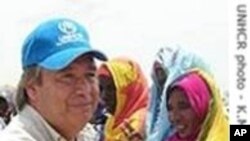<!-- IMAGE -->
At least 46 African nations are expected to sign a declaration Friday, obligating governments and armed rebel groups to protect and assist people uprooted from their homes by war. Details of the new law on the Rights of Internally Displaced Persons will be signed at a special African Union summit in Kampala, Uganda
Its formal name is the Convention for the Protection and Assistance of Internally Displaced Persons in Africa. But it will known as simply as the Kampala Declaration.
It sets out the rights of civilians in conflict zones, and makes clear the legal obligations of governments and armed rebel groups to protect and assist non-combatants.
After years of negotiations, its significance is being marked by a special African Union summit. The United Nations High Commissioner for Refugees, Antonio Guterres, is here for the signing ceremony. So are U.N. emergency relief agency chief John Holmes and International Red Cross, or ICRC, President Jacob Kellenberger.
Kellenberger says many of Africa's top leaders are conspicuously absent. "The number of heads of state who have been here has been very limited indeed. Leave the interpretation to others, but that's a fact," he said.
Aside from the host, Ugandan President Yoweri Museveni, only five top leaders are at the summit. Zimbabwe's Robert Mugabe is here as are Zambia's President Rupiah Banda and Somalia's President Sheikh Sharif Ahmed. Ricardo Mangue Obama Nfubea, the prime minister of Equatorial Guinea, and Mohamed Abdelaziz, the president of the territory of Western Sahara round out the group.
Western Sahara is not recognized as a state by the United Nations, but it is a member of the African Union.
But Africa's Commissioner for Political Affairs Julia Dolly Joiner says representatives of almost all of the 53 AU member states will have representatives on hand for the signing ceremony. "They are represented. But the prime ministers and deputy prime ministers who are sitting here are representing the heads of state at this forum. There is a commitment by 46 member states to take part in the process and for us that is significant enough," she said.
Almost all of what is in the Kampala Declaration is already a part of international law, in documents such as the Geneva Convention and the Declaration of Human Rights. But legal experts say its significance is that it is a concept developed by Africans to solve what is seen as a serious impediment to Africa's development.
U.N. humanitarian affairs chief John Holmes says the convention also recognizes the responsibilities of armed rebel groups who, in many cases, occupy territory. "That's a point we often make to the Taliban or whoever it may be, even al-Shabab in Somalia - that they may not be accepted as legitimate interlocutors. But politically, that doesn't stop them from having responsibilities and we need to point those out to them and make sure they are accountable as well before the world's courts at a certain point," he said.
International observers say it is unlikely that the Kampala Declaration will have any immediate practical effect in African countries riven by war.
But Kellenberger says it sends an important message to government's and so-called "non-state actors," that they might one day face the consequences of their actions. "It is an important political and moral signal because it does set responsibilities, and it does also say, among other things, that the states are obliged to prosecute criminally individuals who commit serious breaches of international humanitarian law," he said.
To become law, the Kampala Declaration must be ratified by 15 African Union member states. That could take years. But on a continent that is home to 11 million internally displaced persons, and several million refugees, AU political chief Joiner says she is confident the process will be complete by early next year.




